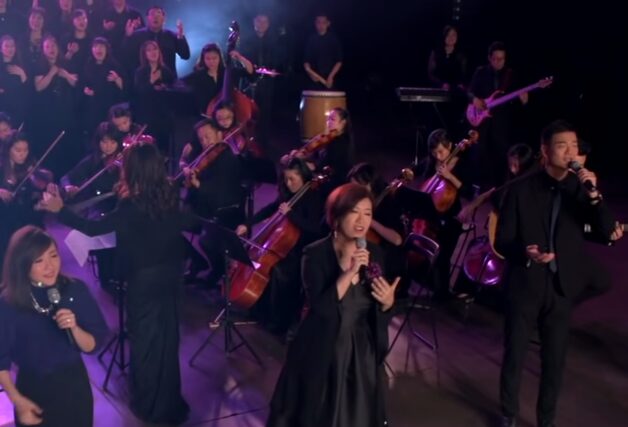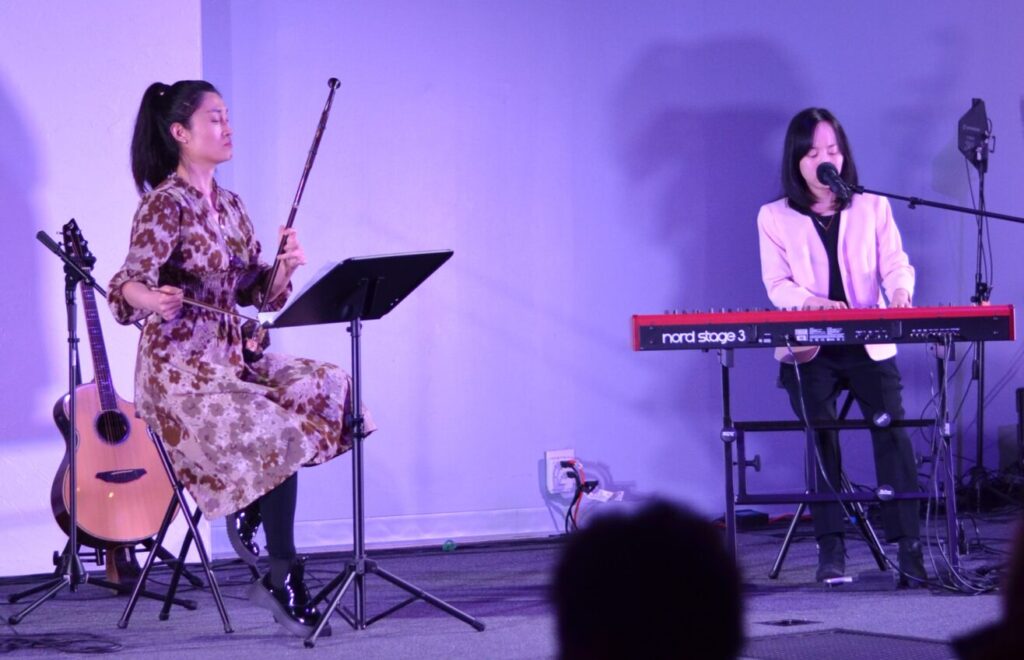This blog is originally published on Gloria Fanchiang Music’s website. Special thanks to Gloria for allowing us to cross-post it here.
Guest Blogger Gloria Fanchiang is a second-generation Taiwanese American songwriter, producer, recording artist and worship leader based in Los Angeles. She is passionate about decolonizing worship and empowering Asian American communities to develop contextualized worship music and liturgy. To read more about her, go to About – Gloria Fanchiang Music.
Introduction

Does Asian American worship music exist, and what could it sound like? Over the past several years I’ve been on a quest to answer these questions as an Asian American songwriter looking for inspiration and songwriting role models who look like me. Though many Asian American churches and ministries often sing worship songs from the likes of Hillsong and Bethel, or Western hymns for the older generation, with a bit of digging, I’ve discovered that worship songs written by and for Asian American Christians have actually been around for decades. And this blog post highlights songs, composers and efforts toward creating worship music for a variety of different Asian American contexts from the 1970s till today.
I mostly feature songs and projects that attempt to contextualize worship for Asian Americans by incorporating Asian cultural references, traditional Asian music and/or the lived experiences of Asian Americans. Additionally, this list focuses on songs/projects that have some notoriety and/or institutional backing, especially from publishing houses, which I believe are helpful to preserve history and pass down songs from one generation to the next. This is of course an incomplete list that I’ve compiled. I’m sure there are other worship songs by Asian Americans of various backgrounds that I am not aware of, but these particular songwriters and projects I’ve come across stuck out to me as unique contributions that have served Asian American Christian communities and beyond.
1970’s
In the 1970s, original worship songs by Wes Terasaki, a Japanese American musician from Southern California, became popular with Asian American Christians across the US because his songs were used at the annual Japanese Evangelical Missionary Society (JEMS) Mount Hermon Summer Conference in California, which gathered Asian American Christians from all over the US. Over the years, JEMS has published recording projects and songbooks of worship music written by Asian Americans, mostly from the LA area, including Wes Terasaki. Terasaki’s music does not speak to Asian American identity and lived experiences in an obvious way either lyrically or musically. However, it is noteworthy how his music touched many Asian American Christian communities because Asian Americans organized themselves and actively supported Asian American songwriters at the Mount Hermon conferences.
1980’s
Hymns from the Four Winds was published in 1983 by Abingdon Press. This collection was put together by a committee of 1st generation immigrants who were members of the National Federation of Asian American United Methodists. The esteemed Dr. I-to Loh, composer and professor of church music, led the committee, which consisted of Chinese, Filipino, Japanese, Korean and Taiwanese representatives. The songbook contains all songs in English, with most being translations from Asian languages. Some songs use traditional Asian melodies, while others draw from Western musical elements or a combination of both Asian and Western music styles. Many songs were “newly written or recently recovered and adapted” (p. v) for the collection. I appreciate that some of the songs have lyrics that speak to Asian American experiences, such as “I Am a Stranger” and “Lamentation of the Wanderer”. I’m not sure how widely this hymn collection has circulated or been used by churches but I think it provides a lot of inspiration, and the book’s introductory notes about how the collection was put together are also very insightful.

Left to right: Wes Terasaki, I-to Loh, Ricky Manalo, Sandy Yu (of Stream of Praise), Russell Yee
1990’s
In the early 90’s, Fr. Ricky Manalo, a 2nd-generation Filipino-Chinese American Catholic priest, professor and composer, began composing for Oregon Catholic Press. Manalo’s music, which draws from both Western and Asian musical influences, is widely used in Catholic churches, including Filipino churches. According to Manalo, his communion song “Many and Great” is “one of the first Asian pentatonic liturgical songs that became popular in mainstream U.S. culture”.
In 1993 Stream of Praise Music Ministries, one of the most prominent Chinese-language contemporary worship music groups today, was established in Southern California by 1.5-generation Taiwanese immigrants. Over the past 30 years, Stream of Praise has published 30+ albums of original worship music, and they are well-known in Chinese-speaking communities around the world. Their music draws from various influences including CCM, gospel and jazz but they also have songs that draw from Chinese culture both lyrically and musically. For example, their song “Peace” incorporates traditional Chinese instruments and uses pentatonic melodies. (Screenshot from “Peace” music video at top of this blog post.)
2000’s
In 2008 Oregon Catholic Press published a Vietnamese hymnal titled Thánh Ca Dân Chúa to serve the large Vietnamese diaspora in North America. The hymnal includes hymns that incorporate traditional Vietnamese music and cultural references from 100+ Vietnamese composers as well as some English translations for the children of Vietnamese immigrants who may not be fluent in Vietnamese. While many of the songs in this hymnal originate from Vietnam, songs from composers like Nguyen Quang Hung (1955-2012) who immigrated to the U.S. after 1975 are also included.
2010’s
In 2012 Rev. Dr. Russell Yee’s book Worship on the Way was published by Judson Press, and to this day it remains the only book published on the topic of Asian American worship. The book includes discussions on how culture relates to worship; challenges to the development of Asian American worship; Yee’s work in gathering and organizing Asian American worship leaders, including hosting the Waterwind Asian American Worship Conference and accompanying Asian American Christian songwriting contest in 2003; examples of worship songs expressing Asian American identity and faith; and more.
Conclusion
Learning about what others have created in the past has encouraged me in my own songwriting journey and efforts to create worship music that speaks to my own context and background. Knowing others have found success doing this difficult work gives me hope that I too am capable of making a meaningful contribution in this field. In fact, in 2021 I released my own original worship song called “God Who Sees Us” after the Atlanta spa shootings where 6 women of Asian descent were murdered. I incorporated my great grandfather’s instrument – the Chinese erhu – with the help of a professional erhuist Feifei Yang, and in the song, I wrote about the long history of anti-Asian racism in the U.S., tying in the story of Hagar, an oppressed woman and foreigner in Genesis 16. By God’s grace, the song has been well received and used by churches, seminaries and conferences across the U.S., including the 2022 Urbana Missions Conference and the 2022 Episcopal Asiamerica Ministries Consultation. No matter who else the song may reach, I’m grateful for the experience of creating an honest worship song that felt true to my experience as an Asian American woman and that helped others voice their own prayers and worship to God.

Feifei Yang and me performing my song “God Who Sees Us”
I hope this brief and incomplete history of Asian American worship music encourages Asian Americans to try their hand at writing their own unique contextualized worship songs and organizing our communities, building upon the work of those who have come before us. Contextualizing worship for Asian Americans and helping them bring their whole selves before God in worship through song may feel daunting and challenging, but it is important work, and we need not do it alone.
—-
Special thanks to Phillip Kim, a member of the JEMS Music Ministry, for sharing with me about JEMS and Wes Terasaki. And thanks to the Hymn Society for sharing with me a presentation for their audience given by Dr. Jonathan Y. Tan, including a discussion of the Vietnamese hymnal Thánh Ca Dân Chúa.
This blog post contains affiliate links which means I earn a small commission if you make a purchase through them, with no extra cost to you. Your support is appreciated if you use the links!


